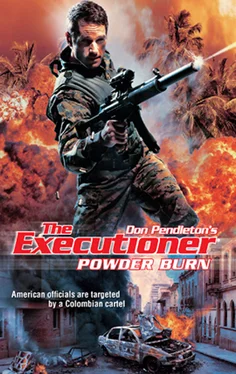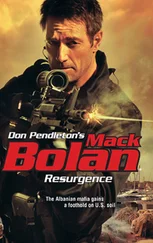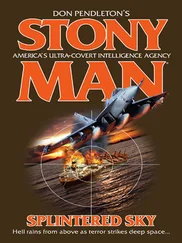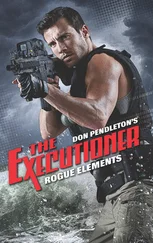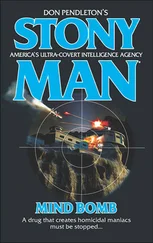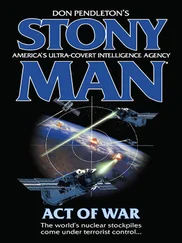And none had been detected. No one had sounded an alarm.
A quarter century had passed since the last attack on Bogotá’s Toma del Palacio de Justicia, and that had been a full-scale frontal assault by thirty-five members of the Movimiento 19 de Abril—M-19. No one believed that such a thing could be repeated in this modern day and age.
They were correct, of course.
Outside, police and military guards ensured that no strike force could storm the Palace of Justice. Anyone who tried it would be cut down in the street or on the steps, before they crossed the threshold.
But who really looked at janitors these days?
Who gave a second thought to peasants taking out the trash?
What thirty men could not accomplish by brute force, a bold half dozen might achieve by stealth. Vergara’s handpicked team had infiltrated the building’s custodial staff one by one, over the past eleven months, performing scut work and pretending they were grateful for the opportunity to serve.
Until this day.
The order had been given. They were privileged to strike against the enemy that morning, each emboldened by the knowledge that if he should fall, his loved ones would be handsomely rewarded. Set for life, in fact.
They each had El Padrino’s word on that.
Vergara steered his broom in the direction of the conference rooms, where soon his enemies would be assembled. They were already in the building. He knew their habits, their compulsion to be punctual. He could almost smell them, drawing closer to their destiny.
Delivered by a peasant’s hand.
Perhaps there was some justice, after all.
OTTO GLASS HADN’T FELT relaxed since he was transferred to Colombia as chief of station for the DEA. But for the moment, after the predictably tense limo ride and the virtual sprint from curbside to relative safety, his stomach was beginning to un-clench.
Glass lived by one simple rule: no one was safe in Colombia, period. Sudden death could strike anyone, anywhere, at any time. And those least secure of the lot were Americans working on drug interdiction programs.
Meaning Glass and his agents, for starters.
He’d been on the job for seven months and had survived three attempts on his life, while another half dozen supposed murder plots were logged and filed from native informants. Glass wore Kevlar whenever he set foot outside his office or downtown apartment, and slept with armed guards at his door.
This day, inside the Palace of Justice with Counselor Webb and a retinue of smiling Colombian officials, Glass felt as safe as he had at any time since he’d stepped off his flight from New York, at El Dorado International Airport.
Everyone had settled into chairs around the highly polished conference table. A deputy vice-minister of the interior and justice sat at the table’s head, flanked by deputy commanders of the Policía Nacional de Colombia and the Departamento Administrativo de Seguridad. A deputy assistant from La Fiscalía General de la Nación—the attorney general’s office—was also present. All of them had aides with tape recorders, legal pads and pens laid out in front of them. All of them were deputies for higher-ups who couldn’t be bothered to show, or who feared being forced to make a decision on the record before witnesses from rival departments.
“I welcome all of you to this historic meeting,” the vice-minister of the interior and justice said, beaming down the table with artificially whitened teeth. “I know all present share my wish that—”
When the door clicked, somewhere to his left rear, Glass turned toward the sound. He saw a slender, squirrel-faced man decked out in coveralls, bracing a push broom with his left hand. Glass had time to wonder why the coveralls were open nearly to his crotch, before he saw the janitor’s right hand and recognized what it was holding.
“Down!” Glass shouted, lunging at Counselor Webb and dragging the startled diplomat down with him, seeking any cover he could find, as two more doors swung open and all hell broke loose.
The close-range gunfire numbed his ears, as Glass half rolled, half dragged Webb under the broad conference table. Glass drew his pistol, clutching it white-knuckled, and discovered that he didn’t have a shot.
The frag grenade came out of nowhere, bouncing on the table, spinning once on impact with the floor, then wobbling toward him like an odd, green-painted Easter egg.
And in the final seconds of his life, all Otto Glass could do was pray.
El Dorado International Airport, Bogotá
Mack Bolan traveled light. His carry-on contained some extra clothes, sparse toiletries, a guidebook to the city and surrounding countryside. Nothing that might alarm security and raise red flags at either end of his long flight from the United States, with a short stopover in Mexico City.
No weapons, for instance, although he’d be needing them soon.
Bolan was early, by design. His contacts were expecting him for early dinner, in the city’s northern quarter known as Chapinero, but he needed solo time before they met, in order to prepare himself.
First up, the wheels. He had a Pontiac G6 reserved with Budget in the main airport terminal. The smiling girl behind the counter photocopied “Matthew Cooper’s” California driver’s license, swiped his credit card—all bills meticulously paid on time, in full—and gave Bolan his keys.
Ten minutes later, he was rolling eastward on Avenida El Dorado, keeping pace with high-speed traffic as he left the airport’s small city behind him. Downtown Bogotá lay nine miles distant from the airport, and he could’ve covered it within five minutes flat, except for a preliminary stop.
He made that stop in Ciudad Kennedy, a district in southwestern Bogotá named for the martyred American president. Bolan’s guidebook told him that the area was Bogotá’s most populous district, home to fourteen percent of the city’s population, but he was only interested in one inhabitant.
The man had a pawn shop two blocks north of Calle Primero de Mayo. He introduced himself as José and accepted Bolan’s nom de guerre without question. José’s shop was a place where money talked, and the merchandise that Bolan sought wasn’t displayed for public scrutiny. A visit to the backroom set him up and took a bite out of his war chest, but the case had been donated by a kiddie pimp in Jacksonville before he shuffled off the mortal coil, and there was always more where that came from.
When Bolan left the shop, he carried two fat duffel bags that might have clanked a bit, if anyone was listening. He also wore a Glock 23 semiauto pistol in a fast-draw sling beneath his left armpit, two extra 13-round magazines pouched on the right for balance. A Benchmade Stryker automatic knife with four-inch Tanto blade was clipped on to his belt, for easy access.
Bolan put the duffels in the Pontiac’s trunk, locked them down and he was good to go.
Traveling naked always made the Executioner uneasy. He could kill a man two dozen ways barehanded, but most shooters wouldn’t close within arm’s reach if they had a choice. And as for tackling more than two or three at once, if they were armed, forget about it.
He was covered for all foreseeable contingencies: two rifles, one for distance and one for assault work; a submachine gun with suppressor for close quarters battle where stealth was required; a combat shotgun, just because; assorted hand grenades, spare ammo for the different weapons, with accessories including jungle camouflage fatigues and hiking boots.
His destination was Chapinero. Bogotá’s most affluent district, and the capital’s banking and financial center, ranged along Calle 72. Bolan wasn’t on a banking mission at the moment, though. No hefty deposits or gunpoint withdrawals. His target was the stylish Andino Mall on Carrera 11 in Bogotá’s Zona Rosa.
Читать дальше
